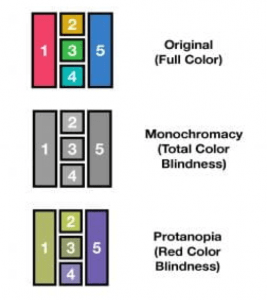This Week for Faculty: How Do You Make Online Classes Accessible?
Accessible and Inclusive Teaching for Any Format
As you plan your Fall 2020 courses, keep accessibility and inclusion in mind so that all your students can participate and succeed in the classroom—whether it may be online or in-person. Learn more about Inclusive Teaching Resources from the CTL.
Accessibility in Teaching and Learning 
This resource provides instructors with an overview of accessibility in teaching and learning in both in-person and online classrooms. Learn general “getting started” strategies for making learning resources, tools, experiences, and opportunities accessible to all learners. Creating an accessible learning environment for your students is a crucial part of an inclusive practice.
Accessibility tip: use graphical indicators in teaching materials, rather than color alone. For example, the logo for the CTL’s Guide for Inclusive Teaching uses both colors and numbers to prevent confusion for users with color blindness.
Design Your Course Using Universal Design for Learning (UDL)
Learners come to classrooms with unique sets of needs and abilities, so it’s important to design courses for accessibility so all students can thrive, especially when students may be learning remotely. Sheryl Burgstahler, a leading expert in accessibility and Universal Design for Learning (UDL), and Director of the DO-IT Center at the University of Washington, discusses the challenges that students with disabilities face in higher education and how faculty can help. Watch below and learn more through the CTL’s self-paced online course Inclusive Teaching: Supporting All Students in the College Classroom, open to all.
Inclusive Teaching and Learning Online
With the shift to online learning, instructors can draw on principles of inclusive teaching to help students feel a sense of belonging, ensure they can access course materials, and support them in achieving learning goals. The current context calls for empathy and resilience on the part of both students and instructors.
The following resource provides strategies for inclusive teaching online and is structured around the five principles of inclusive teaching as outlined in the Guide for Inclusive Teaching at Columbia.
Reflections from Columbia Undergraduate Students
Experiences with Inclusive Teaching and Learning Online
We asked the CTL’s Undergraduate Teaching and Learning Consultants from the Students as Pedagogical Partners initiative to share their thoughts and experiences with inclusive teaching and learning online during the Spring 2020 semester. Here is what they wrote.
 “Accessibility has been at the forefront of my experiences with inclusive online learning. Since I am seven hours ahead of NYC, it has been a challenge making time for some of my classes. However, university policy and faculty members have been allowing for alternative and creative methods of accommodating students, be it through recording lectures or surveying the classroom to see what alternatives suit different students.” – Haya Ghandour, Sophomore, SEAS
“Accessibility has been at the forefront of my experiences with inclusive online learning. Since I am seven hours ahead of NYC, it has been a challenge making time for some of my classes. However, university policy and faculty members have been allowing for alternative and creative methods of accommodating students, be it through recording lectures or surveying the classroom to see what alternatives suit different students.” – Haya Ghandour, Sophomore, SEAS
Remote Teaching and Learning: Three Learners’ Perspectives on Inclusive Teaching
Three student consultants reflected on their experience with online inclusive teaching and learning, and provided questions and suggestions for faculty.
The CTL is Here to Help All Summer
CTL staff are holding daily virtual Office Hours Monday through Friday to help faculty with questions related to teaching online, as well as any other teaching-related inquiries.
You can also arrange a one-on-one consultation by phone or via Zoom for support. Please email CTLfaculty@columbia.edu to set up a time to meet with one of our consultants. You can also request a CTL session for your next department or school gathering.